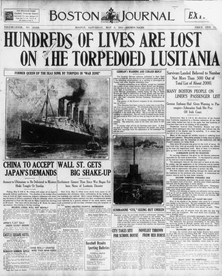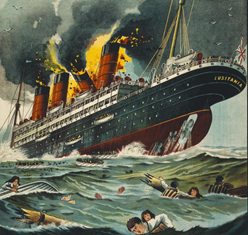The Germans Attack on the Lusitania
Paola Torres
 Up until this time, the United States had remained neutral in the war. People still had their own opinion on which side the U.S should support, but, nevertheless, the country remained in a state of neutrality. Germany had already warned that they would fire upon any ship that was near Britain. This was the result of Britain forcing ships to stop in British ports to check for contraband being sent to Germany and its allies. The declaration from Germany angered Americans.
Up until this time, the United States had remained neutral in the war. People still had their own opinion on which side the U.S should support, but, nevertheless, the country remained in a state of neutrality. Germany had already warned that they would fire upon any ship that was near Britain. This was the result of Britain forcing ships to stop in British ports to check for contraband being sent to Germany and its allies. The declaration from Germany angered Americans.
On May 1st, 1915, the Lusitania left New York to make its way to Liverpool. There were 1,959 total people on board, and 159 of those people were Americans. The Germans had spies all over and were tipped off about the ship. On May 7th, 1915 when a German Submarine spotted the ship, it attacked. Many people died in this attacked, including 128 Americans. The U.S. was outraged, and this event eventually led to the U.S. joining the war.
